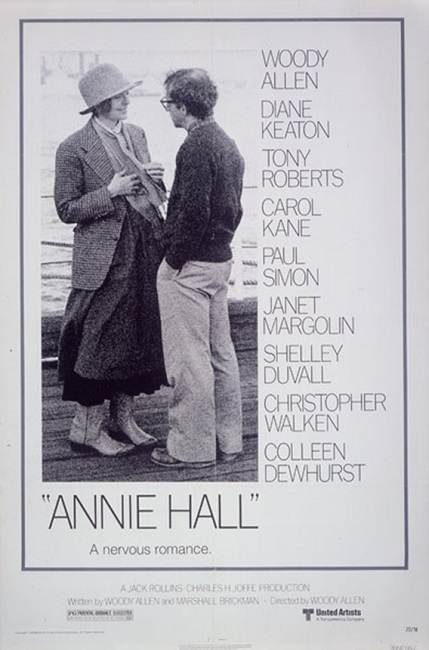
Annie Hall – 1977
Annie Hall was woody Allen’s first attempt at a more adult comedy. One might say that it was a romantic comedy, except that it wasn’t overly romantic, nor did I find it terribly funny. One might say that it was a drama, except that it wasn’t terribly dramatic. It wasn’t a bad movie, but then again, it wasn’t anything special either. It stars, of course, Woody Allen, and Diane Keaton. The story itself wasn’t bad, the production values weren’t bad, the dialogue was alright. The filming locations and costumes were appropriate. Even the casting was perfect, with one exception.
This would have been a good enough movie if it didn’t star Woody Allen.
I’m sorry, but I should say that I’ve never been a huge Woody Allen fan. Despite this fact, I tried to go into this film with an open mind. I understand that there is Woody Allen, the writer/director, and there is Woody Allen, the actor/comedian. The former is easy to stomach, even enjoyable at times. The latter is annoying and should be avoided at all costs. As an actor and a personality, he simply radiates a harsh kind of nervous and neurotic energy. I think that this is supposed to be part of his appeal. Many people find this to be cute or quirky, but I just find it unbelievably irritating. He just sets my teeth on edge.
OK, the plot follows the ins and outs of the romantic relationship between Alvie Singer, played by Allen, and Annie Hall, played by Keaton. The film jumps back and forth between the present time and flashbacks, sometimes several different time periods at the same time. Allen made some fun and interesting choices both as a writer and as a director. There were creative little tricks he used to let the viewer know what was going on inside the characters’ heads.
Interesting note: Woody Allen said, in an interview, that he was never pleased with the end result of Annie Hall. It was apparently supposed to be more about what goes on in a man’s mind, but nobody understood it. Instead, it was about Alvie’s relationship with Annie, which is what people really wanted to see.
For example, there was a conversation that took place between Alvie and Annie on the day they met. The conversation was one of those inane bits of discourse that neither participant had any real interest in. What is really on their minds is the fact that they are each attracted to the other and they are actually making speculations and comments about how they are perceiving the other person, and how they think they are being perceived. While the audience can hear the actual conversation, subtitles appear at the bottom of the screen that show what they are thinking. It was cute and very cleverly done.
Another fun little trick Allen used was seamlessly combining past events and present events, showing how the characters remembered the past. Alvie would begin to describe his childhood and the scene would cut to him as a little boy. But then the adult Alvie would be inserted into the scene and begin commenting on the memory. And what made these little internal monologues more interesting is that the characters within the memory would react and interact with the adult. Again, it was very cleverly done.
Another example of a fun little trick Allen used was breaking the fourth wall and talking directly to the camera. I know I poo-pooed this gimmick in my review for Tom Jones, but Woody Allen got it right. First of all, he did it to tell a character’s inner thoughts and feelings, not to narrate the story or spew exposition. A subtle difference, perhaps, but to me, a significant one. Second, Allen took it a step further in an interesting way. He found a way to break a fifth wall. He would be speaking to the camera while the world continued playing out all around him. But then he would speak with and interact with the people in the background. He would ask them questions pertaining to his thoughts and they would answer him, offering him advice or commentary on his situation. Once again, this was very cleverly done.
Like I said, one of the biggest problems I had with the movie was Woody Allen as the male romantic lead. The character, if you want to call it that because Allen was simply playing himself and not really acting much, was so neurotic, nervous, and downright annoying, that I can’t understand why any woman would want to be romantically involved with him. I mean, Alvie was an ass. He was controlling and manipulative, had a short temper, was paranoid, insanely self-centered, and yet had horrible self-image issues.
But I guess he was funny, or was at least supposed to have been funny, and women will often fall for the guy who can make them laugh. In fact, the character of Alvie was a professional comedian. He lived in New York and enjoyed moderate success in his trade, even going so far as to appear on the Johnny Carson Show. But despite his successful career, he had repeating failures with women. He had two failed marriages behind him and a subsequent fear of commitment. Annie was an aspiring singer who had never taken any voice lessons. I actually liked Keaton and it was nice to watch her. She portrayed a much more realistic character. Annie was a little goofy, and had a desire to try new things and expand her mind. She was adventurous and yet compliant. I thought she was well written.
Other notable characters in the film were Tony Roberts as Alvie’s best friend Rob, Carol Kane as Alvie’s first wife, Allison Portchnik, Paul Simon as Tony Lacey, a record producer interested in representing Annie, and Shelly Duvall as Pam, a girl Alvie goes on a date with. I especially liked Carol Kane. She has one of the best lines in the movie. When Alvie is trying to be funny, he says to her, “You, you, you’re like New York, Jewish, left-wing, liberal, intellectual, Central Park West, Brandeis University, the socialist summer camps and the, the father with the Ben Shahn drawings, right, and the really, y’know, strike-oriented kind of, red diaper, stop me before I make a complete imbecile of myself.” Her response is perfect. “No, that was wonderful. I love being reduced to a cultural stereotype.”
Inexplicably, she marries him, anyway.
In my research, I read a review that said one thing about the film that made a certain amount of sense. It said that the film is not about a romance in the traditional sense, but rather a film that deconstructs the concept of romance and looks at it from a number of different viewpoints. That is a good description except that I think it looked at love from only one viewpoint: Woody Allen’s.
Now, I must also mention, if only slightly, something else about the film that I found significant. It was a film set in the 1970s and so it was very current. Some of the fashions that Diane Keaton wore in the film apparently had a bit of an impact in the fashion world that lasted for several years. She dressed in clothes that sometimes resembled men’s clothing: suit pants, vest, and a man’s tie. But she added a hat that gave it a distinctly feminine look. And I liked how she only buttoned the top button of the vest, allowing the tie to be seen. It was an interesting choice of style. For 1977, it was a very current and smart-looking fashion.
Interesting note: Diane Keaton, herself, some sources suggest, was mostly responsible for the daring fashions that ended up on the screen. When the film’s costume designer, Ruth Morley, saw what Keaton was wearing, Allen recalls her saying, “Tell her not to wear that! She can’t wear that! It’s so crazy!” to which Allen replied “Leave her. She’s a genius. Let’s just leave her alone. Let her wear what she wants.”
My overall opinion of Annie Hall is fairly mixed, possibly even muddled. I didn’t hate the movie, but I didn’t exactly like it either. People say that you either love Woody Allen films or you hate them. Well, with this one, I fell right in the middle. If Allen had let someone else play the role of Alvie, I think I would have liked it more. But then it wouldn’t have been that same “Classic Woody Allen” film that has garnered its own brand of popularity.
I liked the interesting choices Allen made as a director. It was clearly a smart, intellectual film that made you use your brain to keep up with it and to understand all the quirky, almost surrealistic tricks used to show the audience what was going on inside the characters’ heads. He did things that had never been done before and made them work well, something I have to give him a ton of respect for whether I liked him as an actor or not.

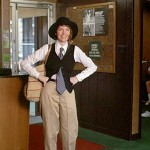
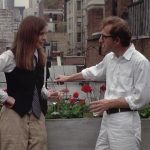
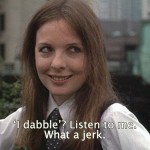
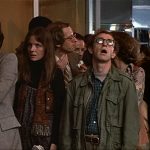
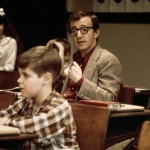
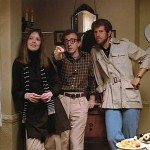


Diane Keaton has stated that Annie Hall was her favorite role and that the film meant everything to her.